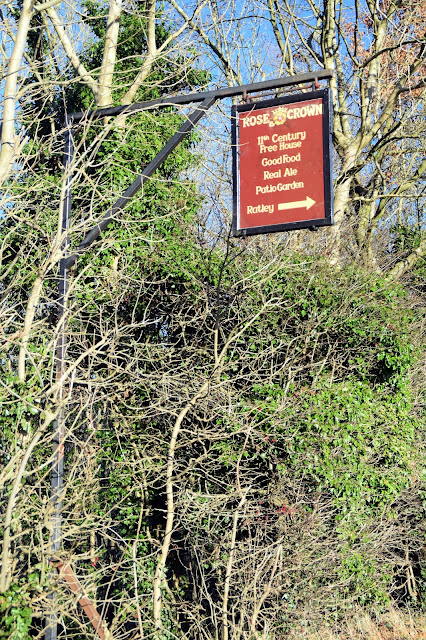The ancient village of Ratley lies close to Upton House on the
Warwickshire/Oxfordshire border.
Ratley is a village in the civil parish of Ratley and Upton, Stratford-on-Avon District, Warwickshire, England. The population of the civil parish in 2011 was 327. It is on the north-west side of the Edge Hill escarpment about 200 metres (660 ft) above sea level.
[ http://www.visitoruk.com/Banbury/ratley-with-edgehill-and-upton-C592-V4032.html]
'Ancient golden-stone beamed village pub, cosy and charming … sun-trap of a beer garden, fantastic friendly ambiance … a gem of a pub'
The local, The Rose and Crown, was a 'spit and sawdust' pub - one room
with beer sold out of a jug until the 1970s, when it was transformed
into a modern pub with brasses, beams, open hearth, and a restaurant. It
is a listed building.


Ratley was a medieval village, facing south and nestling on the edge of
the Cotswolds. It was built on the old Banbury to Stratford road where
the pub and the church stand (now known as Featherbow Lane). From AD
1100 to the turn of the 20th century it changed very little due to poor
transport facilities. Quarrying was its first industry and provided a
livelihood for the inhabitants, while farming was carried out as a means
of survival. The local is a lovely honey brown with blue flashes and
the village keeps its character with dwellings built in this stone. The
Hornton stone quarry is at Edgehill and still brings employment to the
area. The cutting of the old railway line which carried ironstone by
rail through Ratley to the main railway line at Fenny Compton still
remains, but due to a fatal accident in 1913 the line was never
completed.
A barn which belongs to the village was converted into the village hall
in 1937. Previously it had been used as a corn and potato store for the
villagers and at one time as a soup kitchen for the very poor. It is now
well used for recreational and educational purposes.
The village school was built in 1887 but closed in 1976 due to small
numbers of children in the village and high costs. The children now
travel to Tysoe school, approximately 3 miles away.
The church has four bells. The first bell was put in in 1677, a tenor
bell in 1763, a treble in 1859 and another treble in 1985. Amos John
England, now living in a cottage called 'Wayside', followed his
grandfather as bellringer and is, according to a previous rector, 'an
astonishing one-man act on 3 ropes, pulling with both hands and one
foot' .
Land that has been quarried is being reclaimed and planted out with
trees leaving grassy areas in between to encourage wild flowers. It is
designated to become a Nature Reserve. In 1971 the old part of Ratley
was recognised as a Conservation village and this has helped to keep the
character of the village





























No comments:
Post a Comment